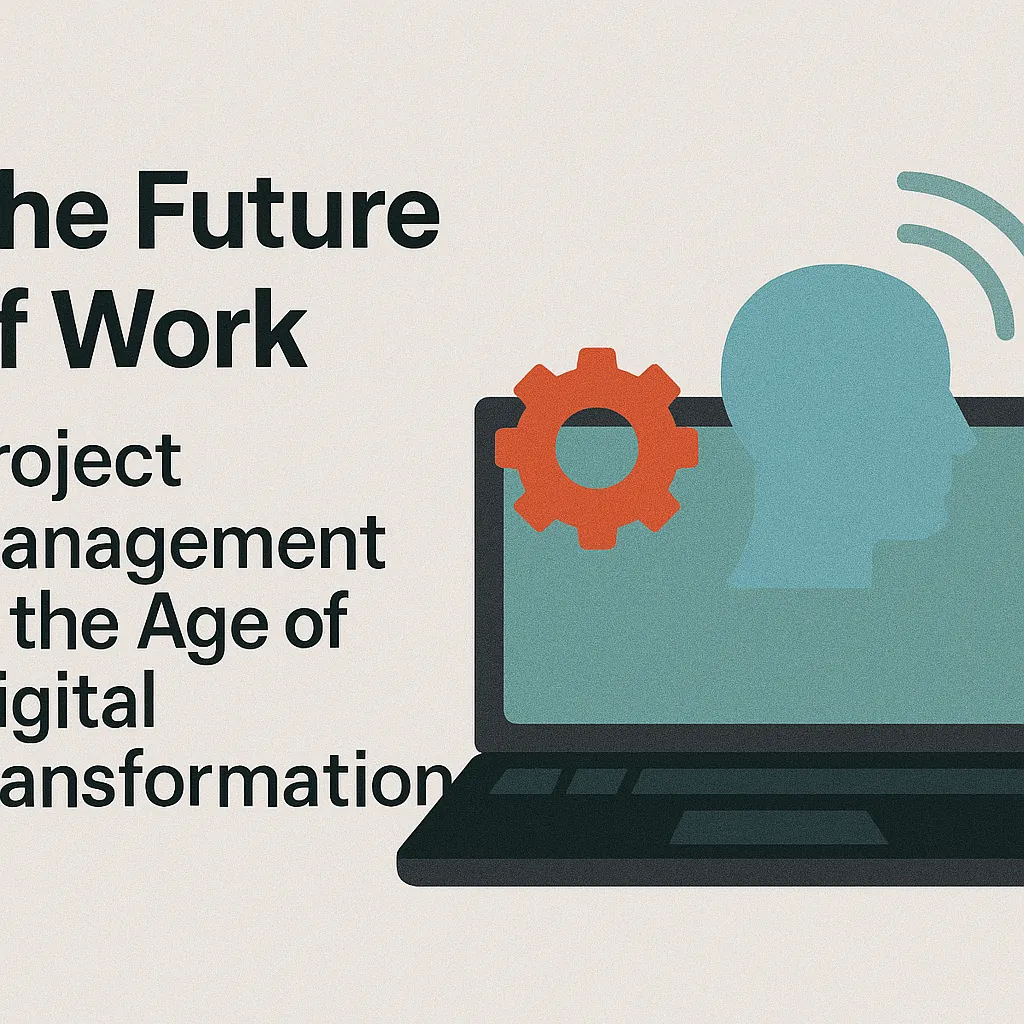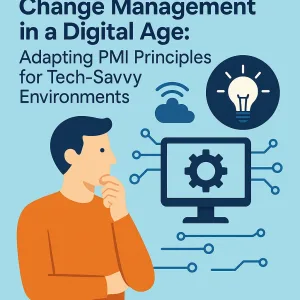Introduction
Digital transformation has emerged as a critical driver of change, reshaping how organizations operate, deliver value, and engage with customers. Digital transformation refers to the integration of digital technology into all areas of a business, fundamentally altering how it functions and how it delivers value to its customers. This transformation is not merely about adopting new technologies; it encompasses a cultural shift that requires organizations to continually challenge the status quo, experiment, and become comfortable with failure. As companies strive to remain competitive in an increasingly digital world, the significance of digital transformation cannot be overstated. It is essential for enhancing operational efficiency, improving customer experiences, and fostering innovation.
Amidst this backdrop, the role of project managers is evolving significantly. Traditionally viewed as the overseers of project execution, project managers are now becoming strategic leaders who must navigate the complexities of digital initiatives. They are tasked with not only managing timelines and budgets but also ensuring that digital projects align with broader organizational goals and drive meaningful change. This shift necessitates a new skill set, including a deep understanding of digital tools, agile methodologies, and change management practices. Project managers must also cultivate strong communication and collaboration skills to effectively lead cross-functional teams in a digital-first environment.
Understanding project management within the context of digital transformation is crucial for several reasons. First, it enables project managers to adapt their methodologies to better suit the fast-paced nature of digital projects, which often require iterative processes and flexibility. Second, it highlights the importance of aligning project outcomes with strategic business objectives, ensuring that digital initiatives contribute to overall organizational success. Finally, as digital transformation continues to accelerate, project managers who embrace this evolution will be better positioned to lead their teams and organizations through the complexities of change, ultimately driving innovation and growth in the digital age.
In this blog section, we will delve deeper into the implications of digital transformation for project management, exploring the skills and strategies that project managers need to thrive in this new era.
Understanding Digital Transformation
Digital transformation is a comprehensive and strategic shift that organizations undertake to leverage technology, enhance processes, and foster a culture of innovation. It encompasses a wide range of changes that fundamentally alter how businesses operate and deliver value to their customers. Here are the key components and implications of digital transformation:
What Digital Transformation Entails
- Technology: At its core, digital transformation involves the integration of digital technologies into all areas of a business. This includes adopting cloud computing, artificial intelligence, big data analytics, and the Internet of Things (IoT) to improve efficiency and decision-making processes. The goal is to create a more agile and responsive organization that can adapt to changing market conditions.
- Processes: Digital transformation requires a reevaluation and redesign of existing processes to eliminate inefficiencies and enhance productivity. This often involves automating routine tasks, streamlining workflows, and implementing data-driven decision-making practices. By optimizing processes, organizations can reduce costs and improve service delivery.
- Culture: A successful digital transformation goes beyond technology and processes; it necessitates a cultural shift within the organization. This includes fostering a mindset of continuous improvement, encouraging collaboration, and promoting a willingness to embrace change. Leaders must cultivate an environment where innovation is encouraged, and employees feel empowered to contribute to the transformation efforts.
Drivers of Digital Transformation
Several key factors are driving the need for digital transformation across industries:
- Market Competition: As businesses face increasing competition, especially from agile startups and tech-savvy companies, the pressure to innovate and differentiate becomes paramount. Organizations must adopt digital strategies to stay relevant and competitive in their markets.
- Customer Demands: Today’s consumers expect seamless, personalized experiences across all touchpoints. Digital transformation enables organizations to better understand customer preferences and behaviors through data analytics, allowing them to tailor their offerings and improve customer satisfaction.
- Technological Advancements: Rapid advancements in technology are reshaping industries and creating new opportunities. Organizations must keep pace with these changes to leverage new tools and platforms that can enhance their operations and customer engagement.
The Evolving Role of Project Managers
As organizations increasingly embrace digital transformation, the role of project managers is undergoing significant changes. This evolution is driven by the need to adapt to new methodologies, technologies, and interpersonal dynamics that define the modern workplace. Here are some key points to consider regarding this transformation:
Shift from Traditional to Agile and Hybrid Methodologies
- Agile Adoption: Traditional project management methodologies, which often emphasize linear processes and extensive documentation, are giving way to agile approaches. Agile methodologies prioritize flexibility, iterative progress, and customer collaboration, allowing project managers to respond more effectively to changing requirements and market conditions. This shift enables teams to deliver value more rapidly and adapt to feedback in real-time.
- Hybrid Models: Many organizations are now adopting hybrid project management models that combine elements of both traditional and agile methodologies. Project managers must be adept at navigating these hybrid frameworks, balancing the structured planning of traditional methods with the adaptability of agile practices. This requires a nuanced understanding of when to apply each approach based on project needs and team dynamics.
The Need for Tech-Savvy Project Managers
- Understanding Emerging Technologies: As digital transformation accelerates, project managers are expected to be well-versed in emerging technologies such as artificial intelligence, machine learning, and cloud computing. This technical knowledge is crucial for making informed decisions, assessing risks, and leveraging technology to enhance project outcomes. Project managers must not only understand these technologies but also how they can be integrated into project workflows to drive efficiency and innovation.
- Data-Driven Decision Making: The ability to analyze data and derive insights is becoming increasingly important. Project managers are now expected to utilize data analytics tools to monitor project performance, forecast outcomes, and make strategic decisions. This shift towards data-driven management requires a new skill set that blends project management expertise with analytical capabilities.
Importance of Soft Skills in a Digital Environment
- Leadership and Communication: In a digital landscape, the importance of soft skills cannot be overstated. Effective leadership is essential for guiding teams through the complexities of digital transformation. Project managers must inspire and motivate their teams, fostering a culture of collaboration and innovation. Strong communication skills are also critical, as project managers need to convey complex information clearly and engage stakeholders across various levels of the organization.
- Emotional Intelligence: As teams become more diverse and remote work becomes commonplace, emotional intelligence is a vital asset for project managers. Understanding team dynamics, managing conflicts, and building relationships are key components of successful project management in a digital age. Project managers who can empathize with their team members and navigate interpersonal challenges will be better equipped to lead their projects to success.
Key Skills for Project Managers in the Digital Age
As digital transformation reshapes the landscape of work, project managers are increasingly required to adapt and evolve their skill sets to meet new challenges. The rapid integration of technology into business processes demands a fresh approach to project management, emphasizing both technical and soft skills. Here are the essential skills that project managers need to thrive in this digital era:
1. Critical Technical Skills
- Data Analytics: In a data-driven world, project managers must be proficient in data analytics to make informed decisions. Understanding how to interpret data can help in assessing project performance, identifying risks, and optimizing resource allocation. Familiarity with analytics tools enables project managers to derive insights that can drive project success.
- Digital Tools Proficiency: Mastery of various digital tools is crucial. Project managers should be adept at using project management software (like Asana, Trello, or Microsoft Project) to plan, execute, and monitor projects efficiently. Additionally, knowledge of cloud-based platforms facilitates seamless collaboration and document sharing among team members.
- Remote Collaboration Software: With the rise of remote work, project managers must be skilled in using collaboration tools such as Slack, Zoom, and Microsoft Teams. These platforms not only enhance communication but also help in maintaining team cohesion and productivity, regardless of geographical barriers.
2. Change Management Skills
As organizations undergo digital transformation, the ability to manage change becomes paramount. Project managers must possess strong change management skills to guide their teams through transitions effectively. This includes:
- Facilitating Adaptation: Project managers should be equipped to help team members adapt to new technologies and processes. This involves understanding the emotional and psychological aspects of change, providing support, and addressing concerns that may arise during the transition.
- Stakeholder Engagement: Engaging stakeholders throughout the change process is essential. Project managers need to communicate the benefits of new technologies clearly and involve team members in the decision-making process to foster buy-in and reduce resistance.
3. Continuous Learning and Industry Awareness
In the fast-paced digital landscape, continuous learning is vital for project managers. Staying updated with industry trends and emerging technologies can significantly enhance their effectiveness. Key aspects include:
- Professional Development: Project managers should actively seek opportunities for professional development, such as attending workshops, webinars, and industry conferences. This not only helps in acquiring new skills but also in networking with other professionals.
- Adaptability to Trends: Being aware of the latest trends in project management methodologies (like Agile and Scrum) and digital tools allows project managers to implement best practices and innovative solutions in their projects. This adaptability is crucial for maintaining a competitive edge in the industry.
Challenges Faced by Project Managers in Digital Transformation
As organizations increasingly embrace digital transformation, project managers find themselves navigating a complex landscape filled with unique challenges. The rapid pace of technological advancement and the need for agile methodologies have redefined the role of project managers, making it essential to recognize and address the obstacles they encounter. Here are some of the key challenges faced by project managers in this evolving environment:
1. Resistance to Change
One of the most significant hurdles project managers face is resistance to change from team members and stakeholders. Employees may be accustomed to traditional processes and hesitant to adopt new technologies or methodologies. This resistance can stem from:
- Fear of the Unknown: Employees may worry about job security or the ability to adapt to new tools.
- Lack of Understanding: Without a clear vision of the benefits of digital transformation, team members may not see the value in changing established practices.
To mitigate this challenge, project managers should focus on effective communication strategies that articulate the benefits of digital transformation and involve team members in the change process.
2. Skill Gaps
The rapid evolution of technology often outpaces the skills of existing team members. Project managers may encounter:
- Insufficient Technical Skills: Teams may lack the necessary expertise to implement and manage new digital tools effectively.
- Need for Continuous Learning: As technologies evolve, ongoing training and development become crucial, but not all organizations prioritize this.
Project managers can address skill gaps by advocating for training programs and fostering a culture of continuous learning. This approach not only enhances team capabilities but also boosts morale and engagement.
3. Integration of New Technologies
Integrating new technologies into existing systems can be a daunting task. Project managers must navigate:
- Compatibility Issues: New tools may not seamlessly integrate with legacy systems, leading to disruptions in workflow.
- Data Management Challenges: Ensuring data consistency and security across platforms can complicate project execution.
To overcome these integration challenges, project managers should engage in thorough planning and stakeholder collaboration. This includes conducting impact assessments and involving IT teams early in the process to ensure a smooth transition.
4. Strategic Planning and Stakeholder Engagement
Effective project management in the context of digital transformation requires robust strategic planning and active stakeholder engagement. Project managers should:
- Develop Clear Roadmaps: Establishing a clear vision and roadmap for digital initiatives helps align team efforts and expectations.
- Engage Stakeholders: Regularly communicating with stakeholders to gather feedback and address concerns fosters a sense of ownership and commitment to the project.
By prioritizing strategic planning and stakeholder engagement, project managers can create a more collaborative environment that supports successful digital transformation.
5. Fostering a Culture of Innovation
Finally, cultivating a culture of innovation within teams is essential for overcoming challenges associated with digital transformation. Project managers can promote innovation by:
- Encouraging Experimentation: Allowing team members to test new ideas without fear of failure can lead to creative solutions.
- Recognizing Contributions: Acknowledging and rewarding innovative efforts can motivate teams to embrace change and contribute to the transformation process.
Best Practices for Project Management in Digital Transformation
As organizations increasingly embrace digital transformation, the role of project managers is evolving significantly. To navigate this complex landscape successfully, project management professionals must adopt best practices that align with the dynamic nature of digital initiatives. Here are some actionable strategies to enhance project management in the age of digital transformation:
1. Embrace Agile Methodologies
- Enhance Flexibility and Responsiveness: Agile methodologies, such as Scrum or Kanban, allow project teams to adapt quickly to changing requirements and market conditions. By breaking projects into smaller, manageable increments, teams can deliver value more frequently and respond to feedback in real-time. This iterative approach not only improves project outcomes but also fosters a culture of continuous improvement.
- Encourage Cross-Functional Teams: Agile promotes collaboration across different departments, enabling diverse skill sets to contribute to project success. Project managers should facilitate the formation of cross-functional teams that can work together seamlessly, leveraging their unique expertise to drive innovation and efficiency.
2. Leverage Collaboration and Communication Tools
- Streamline Project Execution: In a digital environment, effective communication is crucial. Project managers should utilize collaboration tools such as Slack, Microsoft Teams, or Asana to enhance team interaction and project tracking. These platforms enable real-time updates, file sharing, and task management, ensuring that all team members are aligned and informed.
- Foster a Culture of Transparency: By promoting open communication channels, project managers can create an environment where team members feel comfortable sharing ideas and challenges. This transparency not only boosts morale but also leads to more informed decision-making and problem-solving.
3. Implement Frameworks for Measuring Project Success
- Define Clear Metrics: In the context of digital transformation, traditional success metrics may not suffice. Project managers should establish clear, relevant metrics that reflect the unique goals of digital initiatives. This could include user adoption rates, customer satisfaction scores, or return on investment (ROI) for digital tools implemented.
- Utilize Data Analytics: Leveraging data analytics can provide valuable insights into project performance. Project managers should invest in tools that allow for the collection and analysis of data throughout the project lifecycle. This data-driven approach enables teams to make informed adjustments and enhances the overall effectiveness of digital transformation efforts.
- Conduct Regular Reviews: Establishing a routine for project reviews can help teams assess progress against defined metrics. These reviews should focus on identifying successes, challenges, and areas for improvement, allowing project managers to pivot strategies as necessary to ensure alignment with organizational goals.
The Future of Project Management
The landscape of project management is undergoing a significant transformation. The integration of advanced technologies such as artificial intelligence (AI), machine learning, and automation is reshaping how projects are planned, executed, and monitored. This section explores the emerging trends in project management and speculates on the evolving role of project managers in a digitally transformed world.
Emerging Trends in Project Management
Artificial Intelligence and Machine Learning:
- AI and machine learning are becoming integral to project management tools, enabling predictive analytics that can forecast project risks and outcomes. These technologies help project managers make data-driven decisions, enhancing efficiency and effectiveness in project execution.
- For instance, AI can analyze historical project data to identify patterns and suggest optimal resource allocation, thereby reducing time spent on planning and increasing the likelihood of project success.
Automation:
- Automation is streamlining repetitive tasks such as scheduling, reporting, and resource management. By automating these processes, project managers can focus on strategic decision-making and stakeholder engagement rather than getting bogged down in administrative duties.
- Tools that automate communication and updates can also improve transparency and collaboration among team members, fostering a more agile project environment.
Remote Collaboration Tools:
- The rise of remote work has led to the proliferation of collaboration tools that facilitate communication and project tracking across distributed teams. Project managers must adapt to these tools to maintain team cohesion and ensure project milestones are met, regardless of team members’ locations.
Evolving Role of Project Managers
As digital transformation accelerates, the role of project managers is expected to evolve in several key ways:
- Strategic Leadership: Project managers will increasingly take on strategic roles, acting as change agents who guide organizations through digital transformation initiatives. They will need to align project goals with broader business objectives, ensuring that projects contribute to the organization’s overall vision.
- Tech-Savvy Professionals: The demand for project managers who are proficient in digital tools and technologies will grow. Understanding how to leverage AI, data analytics, and automation will be crucial for project managers to remain relevant and effective in their roles.
- Focus on Soft Skills: While technical skills will be important, soft skills such as emotional intelligence, communication, and adaptability will become even more critical. Project managers will need to navigate complex interpersonal dynamics and foster a culture of collaboration and innovation within their teams.
Embracing Lifelong Learning and Adaptability
To thrive in this rapidly changing environment, project managers must commit to lifelong learning and adaptability. This involves:
- Continuous Education: Engaging in ongoing professional development through courses, certifications, and workshops focused on emerging technologies and methodologies in project management. Staying updated on industry trends will empower project managers to implement best practices and innovative solutions.
- Networking and Collaboration: Building a strong professional network can provide project managers with insights and support from peers facing similar challenges. Collaborating with other professionals can lead to shared learning experiences and the exchange of ideas that drive innovation.
- Agility in Mindset: Adopting an agile mindset will enable project managers to respond swiftly to changes and uncertainties in the project landscape. This flexibility will be essential as organizations continue to adapt to new technologies and market demands.
Conclusion
The significance of understanding digital transformation in project management cannot be overstated. The rapid pace of technological advancements is reshaping industries, and project managers are at the forefront of this evolution. They must not only adapt to new tools and methodologies but also understand the broader implications of digital transformation on their projects and teams.
To thrive in this dynamic environment, project managers are encouraged to take proactive steps in developing relevant skills. This includes embracing new technologies, enhancing data analytics capabilities, and fostering a culture of continuous learning within their teams. By investing in their professional development, project managers can better equip themselves to lead successful digital transformation initiatives.
Find out more about Shaun Stoltz https://www.shaunstoltz.com/about/.
This post was written by an AI and reviewed/edited by a human.



